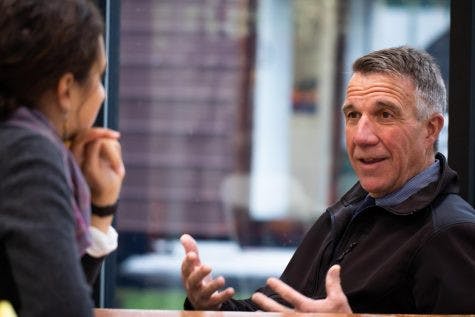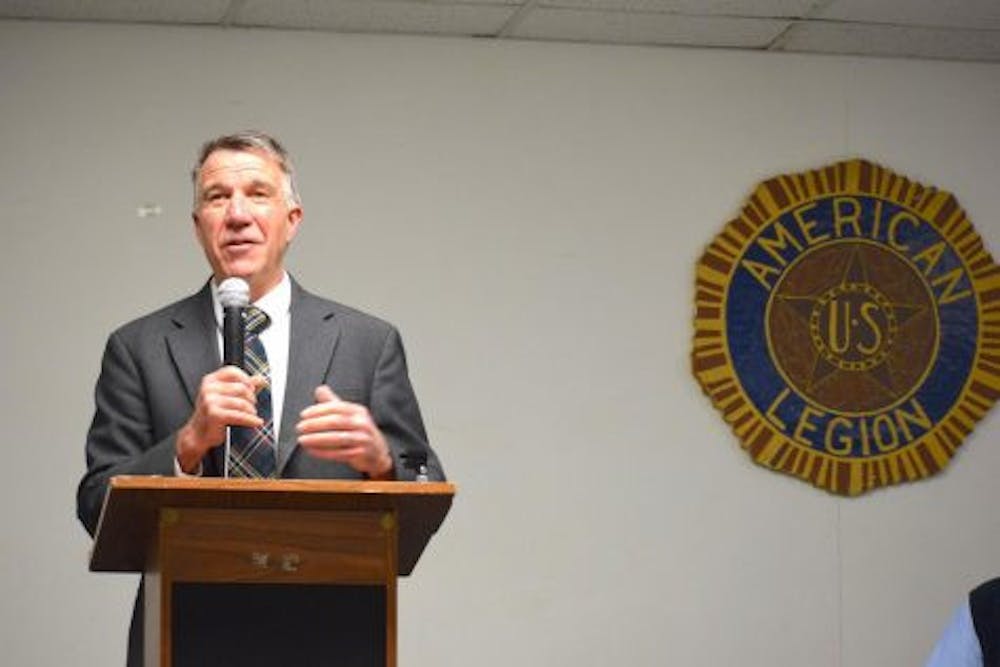Vermont Governor Phil Scott (R) made public his support for the impeachment inquiry against President Donald Trump at a Sept. 26 press conference, making him the first Republican governor in the nation to do so.
“I think the inquiry is important, yes, and where it leads from here is going to be driven by the facts that are established,” Scott said in the press conference.
Scott, a Republican, has been a critic of Trump since the 2016 election cycle.
“[Scott’s] criticism of Trump is pretty well-known,” Professor of Political Science Matthew Dickinson said. “It is a signal, in a very moderate way, that states, ‘I’m not one of those Republicans that will die in support of Trump.’”
Dickinson, an expert in American politics, said that Scott’s decision to back the inquiry was not the first time he publicly spoke out against President Trump.
“When Trump first announced his candidacy and it was clear he was going to win the nomination, Governor Scott was one of the first governors to come out against him,” he said. “That raised a lot of eyebrows because he didn’t have to do that.”
Though Dickinson noted that Scott has never been afraid to critique the President, Dickinson said that Scott’s decision to endorse the inquiry differs from an endorsement of an impeachment.

Governor Phil Scott gave public support for the impeachment inquiry into President Trump at a press conference in late September. Last fall, an editor interviewed Scott about his then-candidacy for re-election.
“At this stage, it’s not a full-blown impeachment,” Dickinson said. “It’s an inquiry into whether we want an impeachment. There’s no actual case being made that says, ‘Yes, the President should be impeached.’”
Dickinson said the real test will be if the Democrats can come up with evidence that warrants impeachment proceedings, and if the Republicans respond by refuting that their criteria for impeachment does not fit within the parameters of the Constitution.
“Then what will Scott say?” Dickinson said.
Dickinson also believes that backing the impeachment inquiry may help Scott’s re-election campaign. As governor of one of the bluest states in the country, Scott’s decision to support the impeachment inquiry reflects Vermont’s larger political atmosphere. It could be a decision that many Vermonters agree with.
“If Phil Scott is running for reelection in a state that is very liberal, he’s hoping that by supporting an impeachment inquiry, he’s telling the voters more in line with Vermont’s politics more than the Republican national, and he’s hoping it will help him,” he said.
“The governor is certainly reflecting the views of Vermonters who aren’t strong supporters [of Trump],” former Vermont Governor Jim Douglas ’72 said. Douglas, also a Republican, was governor of Vermont from 2003 until 2011.
Like Scott, Douglas identifies with a more moderate form of Republicanism that he says has remained in the Northeast, despise growing partisan tensions in Washington.
“Vermont Republicans generally are viewed as more moderate,” Douglas said. “I always felt I had to work across the aisle. I had democratic majorities most of the time I was in office.”
Though Vermont politicians have maintained relatively civil as tensions have flourished elsewhere, Douglas said that he, too, has witnessed the partisan divide grow in Vermont.
“The way I usually put it is it’s not as good as it used to be,” he said. “I was talking with a former legislator last weekend and we agreed that there is a little more rancor and partisanship in Montpelier than there was in the old days. Some of the national mood can’t help but bleed into Vermont, unfortunately.”
Regardless of how party politics differ between Vermont and D.C., Douglas, like Dickinson, was quick to point out that there are many steps that must be taken before impeachment proceedings begin in earnest.
“On impeachment, this is just an initial step,” he said. “My own thought was that if the House leaders feel they have a basis on which to begin an inquiry, then they should do what they feel is right. I think the governor was just saying that if they want to take a look at it, that’s fine.”
While Scott’s decision to support the inquiry makes a political statement, his position in Vermont politics ultimately does not allow him to weigh in on the national level.
“Phil Scott, whether he supports [the inquiry] or not, is not going to affect the debate in the House or the Senate,” Dickinson said. “But it reminds us that the brand of Republicanism that he espouses is a more moderate version than that of the national Republican Party.”

Ariadne Will ’22 is a local editor for the Campus.
She has previously served as a staff writer, where she covered topics ranging from Middlebury’s Town Meeting to the College’s dance performances.
Will also works for her hometown newspaper, the Daily Sitka Sentinel, where she covers tourism and the Sitka Planning Commission.
She is studying English and American literature with a minor in gender, sexuality and feminist studies.



